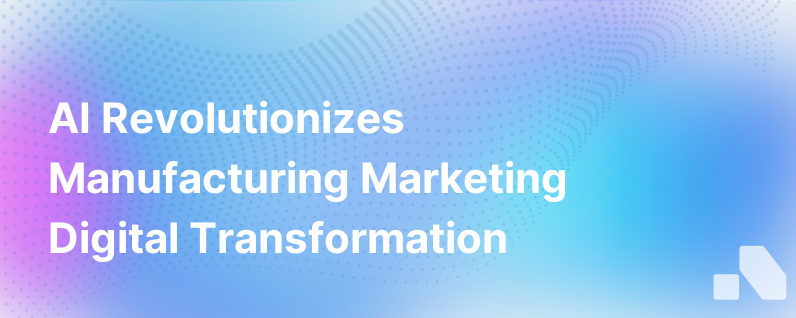Ai Is The Next Evolution In Digital Transformation Heres How It Helps Manufacturing Marketing
Published on December 10, 2023 by David Zhang
In recent years, Artificial Intelligence (AI) has rapidly become an essential driver of digital transformation across various industries. In the manufacturing sector, AI is continuously reshaping how products are designed, produced, marketed, and serviced. Today, it's not simply about automation of the factory floor; AI intersects at the heart of manufacturing, fueling the future of marketing in this bold new industrial landscape.
Digital marketing in the manufacturing industry often lags behind other sectors for myriad reasons, including long sales cycles, complex products and services, and conservative approaches to change. However, with the AI evolution, these challenges are not only being met but transformed into opportunities for growth, enhanced customer experiences, and increased ROI.
AI: The Game Changer in Manufacturing Marketing
Here’s how AI is poised as the next evolution in digital transformation, particularly for marketing within the manufacturing industry:
1. Enhanced Customer Insights
With AI, handling and interpreting vast amounts of data becomes manageable. Marketers can now gather real-time insights about market trends, customer preferences, and behaviors through AI-driven analytics. These insights allow for more personalized and targeted marketing strategies that resonate with each segment of the audience.
2. Predictive Analytics and Sales Forecasting
AI's predictive capabilities are revolutionary, enabling marketers to foresee market changes, consumer demands, and potential sales outcomes. By analyzing historical and real-time data, AI can predict which products will be in demand, allowing sales teams to adjust strategies proactively, optimize inventory, and improve just-in-time delivery models.
3. Personalized Customer Experiences
Manufacturers can now provide highly personalized experiences that were once exclusive to the B2C domain. AI helps create personalized content and recommendations, which is particularly effective in account-based marketing (ABM) campaigns prevalent in manufacturing marketing.
4. Optimizing Pricing Strategies
In the fiercely competitive manufacturing market, pricing can make or break deals. AI enables dynamic pricing strategies where prices are automatically adjusted based on global market trends, material costs, inventory levels, and competitive pricing.
5. Seamless Integration with IoT
The Internet of Things (IoT) is integral to modern manufacturing processes. Combined with AI, IoT provides marketers with real-time operational data that can be used to optimize marketing messages, demonstrate product value, and tailor after-sale service offerings.
6. Lead Scoring and Qualification
AI-driven lead scoring systems allow marketing teams to prioritize leads that are more likely to convert. They can profile the best potential clients based on data-driven insights, ensuring that sales efforts target the most promising prospects.
7. Chatbots and Customer Service
AI-powered chatbots can interact with customers in real time, providing immediate assistance, answering queries, and even facilitating transactions. This increases engagement levels and frees up human customer service reps to tackle more complex tasks.
8. Content Creation and Curation
AI is now aiding in content creation by providing valuable insights into trending topics and keywords for SEO. It can also help curate content for different platforms, ensuring a consistent message that resonates with target audiences while saving time and resources.
9. Enhanced Social Listening
Social listening powered by AI provides unprecedented access to what customers are saying about your brand across various social platforms and the web. This allows for rapid response to any concerns, engaging with customers and managing a brand's reputation more effectively.
10. Supply Chain Optimization
Although indirectly related to marketing, AI's role in supply chain optimization impacts customer satisfaction significantly by ensuring product availability and reducing delays - a key marketing message for manufacturers.
AI in Action: Real-world Marketing Applications for Manufacturing
Let’s dive into some practical applications of AI that are changing the manufacturing marketing landscape:
-
GE Aviation: By using AI and data analytics, GE has optimized its maintenance, repair, and operations (MRO) services, predicting equipment failures before they happen, thus enhancing its marketing message around reliability and advanced service capabilities.
-
Siemens: The company employs AI in its marketing endeavors to analyze customer data across multiple touchpoints, generating a unified customer view that informs targeted marketing campaigns and product development strategies.
-
Caterpillar: With AI and machine learning, Caterpillar offers its customers predictive maintenance services, leveraging these as key differentiators in its marketing strategy to showcase added value and innovation.
Conclusion
In embracing AI, manufacturing marketers can usher in more sophisticated, precise, and impactful strategies that transcend traditional marketing boundaries. AI is not just an adjunct technology; it's the bedrock upon which the next generation of digital transformation is built. It allows manufacturers to tailor their offerings, anticipate customer needs, and enhance relationships in an increasingly competitive market.
While AI can at times seem like a distant frontier, it is essential to recognize that the journey starts with a single step. Implementing AI doesn't have to be an all-or-nothing approach. Platforms like Aomni offer a gateway, delivering AI tools specifically tailored for B2B sales and marketing, easing the transition towards a digitally transformed future in marketing, sales, and beyond.